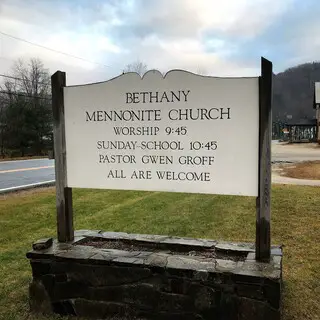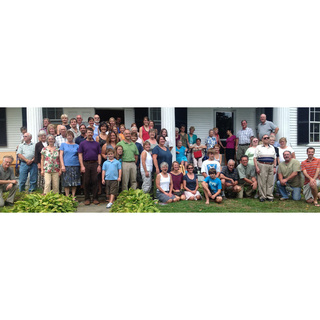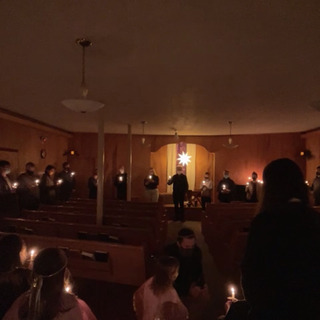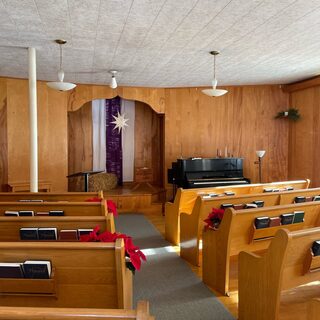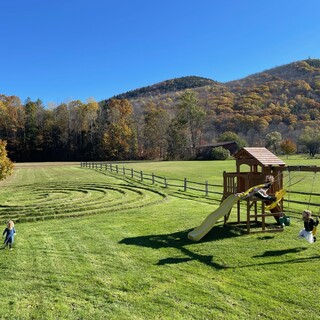We found 1 more Mennonite church near Bridgewater Corners
Who we are
Bethany Mennonite Church is an intimate ecumenical gathering in Bridgewater Corners, Vermont. We began as a small group of five families who followed a call to move here from PA in the early 1950’s. We are currently led by Gwen Groff.
We foster a healthy awareness of the broader Christian faith as it relates to our global community. We are excited about Jesus Christ. We celebrate the transcendence of his birth. We marvel at the complex grace of his time on Earth. We rejoice in the solemn beauty of his death and resurrection. We are excited about continuing His story of a deep love for the women and men around him, as we live and work here in a quiet corner of the world being the hands, feet, body and blood of the Word-made-Flesh.
We come from all walks of life. We come from all political persuasions. We come from all economic backgrounds. Our common theme is our deep love of the way of Jesus. We love to sing together. We love to eat together. We love to camp together. Our children are important to us. That they have a safe place to seek out their Creator is tantamount to our existence as a body of faith.
In light of all of this, we see ourselves as good soil- no more and no less. Good things grow here.
Mission
The Bethany Mennonite Church mission is to nurture people in the Christian faith with an Anabaptist perspective and to carry these values into the local and world communities. As an extension of our faith we desire to be people who: Invite others to embrace the good news of God’s salvation; experience God’s grace and love; nurture a healthy understanding of God, self and others; foster the ability to resolve conflict and promote justice; nurture emotional and spiritual growth, understand and model an Anabaptist Christian lifestyle; exercise our gifts in service to God. The center of all we do and are is to bear witness to Jesus Christ, being unified by our common commitment to a shalom community.
We foster a healthy awareness of the broader Christian faith as it relates to our global community. We are excited about Jesus Christ. We celebrate the transcendence of his birth. We marvel at the complex grace of his time on Earth. We rejoice in the solemn beauty of his death and resurrection. We are excited about continuing His story of a deep love for the women and men around him, as we live and work here in a quiet corner of the world being the hands, feet, body and blood of the Word-made-Flesh.
We come from all walks of life. We come from all political persuasions. We come from all economic backgrounds. Our common theme is our deep love of the way of Jesus. We love to sing together. We love to eat together. We love to camp together. Our children are important to us. That they have a safe place to seek out their Creator is tantamount to our existence as a body of faith.
Mission
The Bethany Mennonite Church mission is to nurture people in the Christian faith with an Anabaptist perspective and to carry these values into the local and world communities. As an extension of our faith we desire to be people who: Invite others to embrace the good news of God’s salvation; experience God’s grace and love; nurture a healthy understanding of God, self and others; foster the ability to resolve conflict and promote justice; nurture emotional and spiritual growth, understand and model an Anabaptist Christian lifestyle; exercise our gifts in service to God. The center of all we do and are is to bear witness to Jesus Christ, being unified by our common commitment to a shalom community.
Church Address
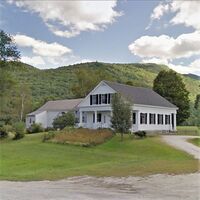
169 VT-100A
Bridgewater Corners,
VT
05035
United States
Phone: 802-672-3488
Download Bethany Mennonite Church vCard with Service Times
Click here to contact the church
Church Pastor

Gwendolyn M. Groff
Minister
169 VT-100A
Bridgewater Corners,
VT
05035
United States
Phone: 802-672-3488
Download Minister Gwendolyn M. Groff vCard with bio
Click here to contact Gwendolyn M. Groff
Denomination
Mennonite Church
Mennonite Churches in Bridgewater Corners, VT
Mennonite Churches in Vermont
Mennonite Churches in United States
Mennonite Churcheses near me
All churches in Bridgewater Corners, VT

Affiliations
Mennonite Church USA
Church Website
Bethany Mennonite Church on Social Media
Leadership
Leader Name:
Gwendolyn M. Groff
Leader Position:
Minister
Formal Title:
Leader Address:
Phone:
Fax:
Leader Email:
Click here to contact Gwendolyn M. Groff
Leader Bio:
Gwen has been pastor at Bethany since 1999. Before moving to Vermont she worked at Mennonite Central Committee in the Overseas Peace Office and as Director of Women’s Concerns. She received a Master of Divinity from Lancaster Theological Seminary. She and her husband Robert are parents of a teenage son and daughter.
Bethany will soon be hiring an interim pastor to be with us as we begin the search for a new pastor for our church. Our former pastor Gwen Groff has stepped back from work at Bethany after 23 years of ministry here. She is pursuing work as a spiritual director, among other things. We are so thankful for our years with her and bless this time of transition.
Bethany will soon be hiring an interim pastor to be with us as we begin the search for a new pastor for our church. Our former pastor Gwen Groff has stepped back from work at Bethany after 23 years of ministry here. She is pursuing work as a spiritual director, among other things. We are so thankful for our years with her and bless this time of transition.
Gwendolyn M. Groff on Social Media:
Other Church Leaders:
Leadership Photos
Add a Photo
Administration
Admin Name:
Admin Position:
Admin Address:
Phone:
Fax:
Admin Email:
Mailing Address
Driving Directions
Travel/Direction Tips
Know how to get there? Share the knowledge with others!
Parking
Please share parking information and/or parking experience!
Bethany Mennonite Church Service Times
We meet on Zoom every Sunday at 10:30 a.m.
Please contact Wendy at gardenersjournal at gmail.com for a Zoom link.
It's been more than 11 months since the last service times update. Please make sure to contact the church to confirm service times.
Please contact the church to confirm Service Times or SUBSCRIBE to updates below
Please contact Wendy at gardenersjournal at gmail.com for a Zoom link.
It's been more than 11 months since the last service times update. Please make sure to contact the church to confirm service times.
Please contact the church to confirm Service Times or SUBSCRIBE to updates below
Worship Languages
Dress Code
Sunday School / Children and Youth Activities
Under 12s:
Kids
We love kids! Kids are our future. Jesus said “Truly I tell you, unless you change and become like little children, you will never enter the kingdom of heaven.” They need us and we need them. If you have a young family Bethany Mennonite is a great place for you and your kids. We don’t even mind when babies cry during the service!
After the Sunday worship service, we do two things depending on your age:
Adult Christian Education Hour OR Coffee Hour
Sunday School
We are able to increase or decrease the number of Sunday School classes depending on the number and age of the children attending.
If you’re not sure about attending church, consider Bethany Birches Camp. It’s a great place that was founded by the same folks who founded Bethany Mennonite Church.
We love kids! Kids are our future. Jesus said “Truly I tell you, unless you change and become like little children, you will never enter the kingdom of heaven.” They need us and we need them. If you have a young family Bethany Mennonite is a great place for you and your kids. We don’t even mind when babies cry during the service!
After the Sunday worship service, we do two things depending on your age:
Adult Christian Education Hour OR Coffee Hour
Sunday School
We are able to increase or decrease the number of Sunday School classes depending on the number and age of the children attending.
If you’re not sure about attending church, consider Bethany Birches Camp. It’s a great place that was founded by the same folks who founded Bethany Mennonite Church.
Under 18s:
Local outreach & community activities
Other activities & ministries
Special Needs/Accessibility
Prayers and Hymns
Main Bible:
Hymns and Songs:
Other information
Average Adult Congregation:
Average Youth Congregation:
Additional Info:
Bethany Mennonite Church Bridgewater Corners Photos
Bethany Mennonite Church History
Bethany Mennonite Church of Bridgewater: A History
By Laura Power Special To The Standard
In the spring of 1952, three families from eastern Pennsylvania moved to Vermont. They left friends and relatives in their home communities near the town of Blooming Glen; they abandoned jobs and businesses. Between them, they had seven children; none among the six adults had the promise of paid employment in the Green Mountain state, nor even any prospects. What Lloyd and Alice Moyer, Howard and Beulah Kulp, and Wilmer and Jean Schmell did have was a sense of purpose. At the behest of the Mission Board of the Franconia Conference of Mennonites, they hoped to establish and nurture a new church in Bridgewater Corners.
The Mennonites then in Vermont amounted to barely a handful; a few met for worship at churches in Andover and Bartonsville. In fact, Mennonites were, and are, scarce across all of America; in the 1950’s just seven states counted follower populations of 5,000 or more. And outside their own close-knit communities clustered mostly in pockets of Pennsylvania, Ohio, Kansas, Indiana, Illinois, California, and Iowa, the Mennonites were often viewed as a cult-like sect. But the Moyers, Kulps, and Schmells believed in the Christian tradition of spreading the teachings of Jesus, a practice re-energized among the Mennonites by a revivalist movement in the mid-twentieth century. So, honored by the opportunity to serve their church, but also apprehensive, the little group set out with the mindset that God and hard work would somehow take care of their needs.
Vermonters in Bridgewater and Plymouth were not completely unfamiliar with the denomination’s practices and beliefs. When gas rationing ended after World War II, Mennonites traveling through the area noted a dearth of open, flourishing churches, a circumstance they attributed to tepid community support and a shortage of pastors returning to Vermont after the war.
As a trial undertaking in 1947, the group ran two-week-long vacation Bible Schools for children in seven central Vermont communities. Their door-to-door solicitations for students were fruitful. “Amazingly people sent a large number of children,” noted John Lutz, an active church member in the 1960s and a former Mennonite pastor. The leaps of faith by parents enrolling their children were rewarded with “the sheer goodness that they felt in the interactions with those who taught…” added Lutz.
After five years of successful summer Bible Schools, the Franconia Mission Board bought a building and six acres located a few hundred feet south of the Ottauquechee River on Route 100A in Bridgewater Corners. The structure, Wilmer Schmell wrote in his memoirs, was “a large private home with porches and columns on two ends and looked like a public building.” Vermonter Josiah Josselyn built it in the mid 19th century, probably in1840, from lumber milled around the corner, on property that he bought from his father-in-law. It was a big, rambling house, with a barn attached at the rear. In 1876, Josselyn also designed and commissioned the construction of a hall, reportedly the first Grange Hall in Vermont, on the adjacent property. There isn’t much recorded history of the house itself. It stayed in the Josselyn family for many years, until the early twentieth century, and then changed hands a few times.
When the Mennonites bought the home in 1952, the seventeen-room building was in need of repair and renovation. Its only running water came from two pitcher pumps. The lone bathroom was supplemented with an indoor privy in the barn end of the building. The five-holer “was carrying togetherness a little too far,” wrote Schmell.
A group of volunteers left Blooming Glen after an evening Easter service and arrived in Vermont the following morning to begin work to convert part of the structure into a meeting house, and the rest into a parsonage. So many volunteers worked on the building that Schmell recalls it “led to the false impression by some [people in the community] for a long time that we owned things in common. A few thought we might be Communists.” The church’s pastor, Abram Landis, and his family moved in nine weeks after the work began. The first service was held on June 29, 1952. One hundred and fifty six attended the dedication in July. The Kulps, Moyers, and Schmells, along with Landis, chose the name “Bethany Mennonite” for the new church, after the place outside of Jerusalem that Jesus reputedly visited and from where he is said to have ascended into heaven. The Mennonites are named for Menno Simons, a Roman Catholic priest born 1496 in the Netherlands. Simons did not found the Anabaptist movement from which the Mennonite denomination sprang, nor was he its most prominent devotee. But as its apostle after leaving the Catholic Church in 1536, he traveled throughout northern Germany teaching and forming congregations. Within several years, disciples of the faith began to be known as Mennonites.
The first Anabaptists surfaced in the 16th century, before Menno Simons’ conversion, as a splinter of the Protestant Reformation, a movement to ameliorate some practices of the Roman Catholic Church. Anabaptists, meaning “again” Baptists, rejected the notion of infant baptism, finding no scriptural basis for it. Instead, they advocated adult baptism for people who were willing to publically attest that they were followers of Christ, a philosophy that necessarily entailed a separation of church and state. Embracing such a doctrine in Europe in the 1500’s was dangerous; of Simons, Mennonite historian Daniel Cassel wrote, “he would go into the depths of the forest to minister to his scanty flock assembled there; again in the caves of the earth he gathered his faithful ones…They were persecuted by Catholics and Protestants alike.” Some estimate that thousands of Anabaptists were beheaded, drowned, or burned at the stake. In areas where their beliefs were marginally tolerated, the Anabaptists endured oppression of other kinds; they were not allowed to inherit land, for example, were barred from trade guilds and universities, and made to pay special taxes.
Still, the Mennonite sect in Europe took hold and grew slowly. English Quaker William Penn’s invitation to enjoy religious freedom in land he’d been granted in the new world, however, sparked a migration among them that began in 1683. An estimated 8,000 Mennonites migrated from Switzerland and Germany in waves over two centuries; in the late 19th century, another 18,000 came to the United States and Canada from Russia, where their ancestors had resettled one hundred years prior. By the time the Schmells, Moyers and Kulps, were setting down roots in Vermont, Mennonites in the United States numbered close to 160,000.
The three families adjusted to life in their adopted community. Wilmer Schmell had received an unexpected loan and was able to buy a house in Plymouth. A local contractor and neighbor stopped by as Schmell was remodeling his kitchen, noted the quality of his work, and offered him a job. The Kulps and Moyers had sold property in Pennsylvania, so Howard and Beulah Kulp bought a farm in Hale Hollow, also in Plymouth. Kulp found a job as a Singer sewing machine salesman. The Moyers purchased a home off Route 4 in Sherburne (now Killington). Lloyd Moyer brought a sizeable cable tool rig with him, and looked for work drilling water wells. The first job was six months in coming, and the unpredictable sub-terrain in Vermont soon taught him why the drilling price per foot here was triple what he’d charged in Pennsylvania. But he persisted, and his first well, in Tyson, was successful and led to other work.
The police chief from Souderton, Pennsylvania, near the families’ home church in Blooming Glen, brought the group a big red bus, the former coffee wagon for the Souderton Fire Company. Bethany Mennonite used it to pick up and drop off children, and some adults, who attended Sunday School and church services. Congregants back in Pennsylvania supported the church financially at first and in other ways as well. “We had visitors almost every weekend in our homes the first summer and fall,” wrote Schmell.
The vacation Bible School continued to be popular, its average enrollment increased from 80 or 90 per session to nearly 200 when combined with the summer schools of the Bridgewater Congregational and Center Churches. Bethany Mennonite Sunday services usually drew between 60 and 100. Schmell found more and more work as a carpenter and builder. He and his wife also bought 1800 laying hens, they had been in the chicken business in Pennsylvania, and sold eggs door-to-door in Rutland one day a week. The opening of the Killington Ski Area in the late 1950’s created a boom in demand for water wells, and Lloyd Moyer drilled many of them. “He was trusted as an honest driller and had a backlog of wells to drill,” wrote Schmell, “so his Ottaquechee Drilling Company operated three rigs for a while.”
In the late 1950s, Schmell and another carpenter built the White Cottage Snack Bar for the Kulps. Beulah Kulp cooked minute steak sandwiches made from the shorthorn beef cattle the family raised on their farm. “A few in the community thought it would not be a success because they were not open Sundays for business,” wrote Schmell, “However, they did quite well even though they were not open in winters either.” In 1961, Schmell oversaw construction of the Ottauquchee Motel for Abram Landis, Bethany Mennonite’s first pastor. A few years later, Schmell built his own motel, the Farmbrook in Plymouth.
The three Bethany Mennonite founding families remained in Vermont for decades, carving out a role for their church in the religious community and inscribing the local landscape with the marks of their perseverance and singular work ethics. “We made many mistakes and learned a lot,” wrote Schmell of the group’s endeavor in Vermont, and, he added, they grew “to love and to appreciate Vermont and its people.”
Today, Bethany Mennonite’s low-key but dedicated congregation of thirty or forty meets weekly in the same sanctuary that volunteers from Pennsylvania created nearly sixty years ago. The presence of pews is perhaps its only characteristic that fits with a conventional physical envisioning of a church. “There is a pulpit,” says pastor of twelve years Gwen Groff, but “It’s back in a little closet.” A simple podium for speakers better fits the church’s flat hierarchy, she adds.
The congregation is part of the Mennonite Church USA, an umbrella organization that guides about 110,000 followers in forty-four states. All told, according to the Global Anabaptist Mennonite Encyclopedia, there are about 360,000 Mennonites in the United States, including the Amish and twenty-five or so smaller Mennonite denominations derived from the Anabaptists. “There’s a whole spectrum between Amish, Amish Mennonite, conservative Mennonite with very visibly different dress, lifestyle, whether they drive cars, have electricity, wear the head covering,” says Groff, “This church [Bethany Mennonite] is liberal, in dress, in lifestyle. In theological beliefs, we have a pretty good diversity.”
Congregations of the Mennonite Church USA are relatively independent. Their twenty-four article Confession of Faith describes underlying doctrine, but, says, Groff, “There is not an expectation that every church or even every minister will subscribe to every belief in that Confession.” All denominations are united in that they read the bible seriously, as a guide for life. In addition to basic Christian precepts, the Mennonites strongly emphasize peace and justice. “It’s been a pacifist denomination since the beginning,” says Groff. She notes that the Mennonite church in Taftsville was begun in 1957 to accommodate men who, due to their status as conscientious objectors to military duty, opted for “1-W” tours at the then Mary Hitchcock Hospital in Hanover, NH. Mennonites also stress service, “doing God’s work and being in the community,” says Groff, and the discipleship of following Jesus.
Bethany Mennonite, compared to many congregations, is “very lay-led,” says Groff, “anybody here can serve communion, pray the pastoral prayer, or preach.” Weekly services generally focus on the sermon, but singing is also important. Mennonites have been singing four-part, acapella harmony for about 400 years. A rich blend of voices at Bethany Mennonite is not limited to an occasional, rehearsed chorale, it’s heard in almost every hymn, every Sunday. It’s a special way for worshippers to pray together in a service that otherwise includes little ritual. The singing, Groff says, helps congregants “to address God together as a community. Singing reminds us that we need each other. We can’t harmonize alone.”
A labyrinth in the field behind the church is also testament to the congregation’s facility for finding means to create community and express devotion. To make the maze, Groff let the grass grow long before cutting it, then with the trimmings laid out a pattern in a classical seven circuit design. After another week or so of growth, she cut the grass again, between the lines she’d laid out. Although Groff originally intended the labyrinth as a vehicle for her own meditation and prayer, eventually, the church’s worship committee decided to incorporate it into their annual summer outside worship service. First, the children of the congregation run to the center, get grapes and goldfish, then run back out. Next the adults quietly contemplate as they silently pass by each other and trace the maze’s paths. “It’s really beautiful when people walk in it,” says Groff, “This is a good group of people, a good group to join to try to figure out what it means to follow Jesus.”
The Bethany Mennonite Church is at 169 Route 100A in Bridgewater Corners. Sunday church service is at 9:45, and is followed by Sunday School. The church is also affiliated with the Bethany Birches Camp in Plymouth, which conducts summer and winter programs for children.
By Laura Power Special To The Standard
In the spring of 1952, three families from eastern Pennsylvania moved to Vermont. They left friends and relatives in their home communities near the town of Blooming Glen; they abandoned jobs and businesses. Between them, they had seven children; none among the six adults had the promise of paid employment in the Green Mountain state, nor even any prospects. What Lloyd and Alice Moyer, Howard and Beulah Kulp, and Wilmer and Jean Schmell did have was a sense of purpose. At the behest of the Mission Board of the Franconia Conference of Mennonites, they hoped to establish and nurture a new church in Bridgewater Corners.
A group of volunteers left Blooming Glen after an evening Easter service and arrived in Vermont the following morning to begin work to convert part of the structure into a meeting house, and the rest into a parsonage. So many volunteers worked on the building that Schmell recalls it “led to the false impression by some [people in the community] for a long time that we owned things in common. A few thought we might be Communists.” The church’s pastor, Abram Landis, and his family moved in nine weeks after the work began. The first service was held on June 29, 1952. One hundred and fifty six attended the dedication in July. The Kulps, Moyers, and Schmells, along with Landis, chose the name “Bethany Mennonite” for the new church, after the place outside of Jerusalem that Jesus reputedly visited and from where he is said to have ascended into heaven. The Mennonites are named for Menno Simons, a Roman Catholic priest born 1496 in the Netherlands. Simons did not found the Anabaptist movement from which the Mennonite denomination sprang, nor was he its most prominent devotee. But as its apostle after leaving the Catholic Church in 1536, he traveled throughout northern Germany teaching and forming congregations. Within several years, disciples of the faith began to be known as Mennonites.
The three families adjusted to life in their adopted community. Wilmer Schmell had received an unexpected loan and was able to buy a house in Plymouth. A local contractor and neighbor stopped by as Schmell was remodeling his kitchen, noted the quality of his work, and offered him a job. The Kulps and Moyers had sold property in Pennsylvania, so Howard and Beulah Kulp bought a farm in Hale Hollow, also in Plymouth. Kulp found a job as a Singer sewing machine salesman. The Moyers purchased a home off Route 4 in Sherburne (now Killington). Lloyd Moyer brought a sizeable cable tool rig with him, and looked for work drilling water wells. The first job was six months in coming, and the unpredictable sub-terrain in Vermont soon taught him why the drilling price per foot here was triple what he’d charged in Pennsylvania. But he persisted, and his first well, in Tyson, was successful and led to other work.
The vacation Bible School continued to be popular, its average enrollment increased from 80 or 90 per session to nearly 200 when combined with the summer schools of the Bridgewater Congregational and Center Churches. Bethany Mennonite Sunday services usually drew between 60 and 100. Schmell found more and more work as a carpenter and builder. He and his wife also bought 1800 laying hens, they had been in the chicken business in Pennsylvania, and sold eggs door-to-door in Rutland one day a week. The opening of the Killington Ski Area in the late 1950’s created a boom in demand for water wells, and Lloyd Moyer drilled many of them. “He was trusted as an honest driller and had a backlog of wells to drill,” wrote Schmell, “so his Ottaquechee Drilling Company operated three rigs for a while.”
The three Bethany Mennonite founding families remained in Vermont for decades, carving out a role for their church in the religious community and inscribing the local landscape with the marks of their perseverance and singular work ethics. “We made many mistakes and learned a lot,” wrote Schmell of the group’s endeavor in Vermont, and, he added, they grew “to love and to appreciate Vermont and its people.”
Today, Bethany Mennonite’s low-key but dedicated congregation of thirty or forty meets weekly in the same sanctuary that volunteers from Pennsylvania created nearly sixty years ago. The presence of pews is perhaps its only characteristic that fits with a conventional physical envisioning of a church. “There is a pulpit,” says pastor of twelve years Gwen Groff, but “It’s back in a little closet.” A simple podium for speakers better fits the church’s flat hierarchy, she adds.
Congregations of the Mennonite Church USA are relatively independent. Their twenty-four article Confession of Faith describes underlying doctrine, but, says, Groff, “There is not an expectation that every church or even every minister will subscribe to every belief in that Confession.” All denominations are united in that they read the bible seriously, as a guide for life. In addition to basic Christian precepts, the Mennonites strongly emphasize peace and justice. “It’s been a pacifist denomination since the beginning,” says Groff. She notes that the Mennonite church in Taftsville was begun in 1957 to accommodate men who, due to their status as conscientious objectors to military duty, opted for “1-W” tours at the then Mary Hitchcock Hospital in Hanover, NH. Mennonites also stress service, “doing God’s work and being in the community,” says Groff, and the discipleship of following Jesus.
A labyrinth in the field behind the church is also testament to the congregation’s facility for finding means to create community and express devotion. To make the maze, Groff let the grass grow long before cutting it, then with the trimmings laid out a pattern in a classical seven circuit design. After another week or so of growth, she cut the grass again, between the lines she’d laid out. Although Groff originally intended the labyrinth as a vehicle for her own meditation and prayer, eventually, the church’s worship committee decided to incorporate it into their annual summer outside worship service. First, the children of the congregation run to the center, get grapes and goldfish, then run back out. Next the adults quietly contemplate as they silently pass by each other and trace the maze’s paths. “It’s really beautiful when people walk in it,” says Groff, “This is a good group of people, a good group to join to try to figure out what it means to follow Jesus.”
Bethany Mennonite Church Historical Photos
Add a historical photo
 "Prayer is the greatest of all forces, because it honors God and brings him into active aid."
"Prayer is the greatest of all forces, because it honors God and brings him into active aid."E.M. Bounds
Bethany Mennonite Church listing was last updated on the 23rd of January, 2024
THANK YOU FOR VISITING BETHANY MENNONITE CHURCH ONLINE!
Bethany Mennonite Church Accelerated Mobile Page (AMP)


